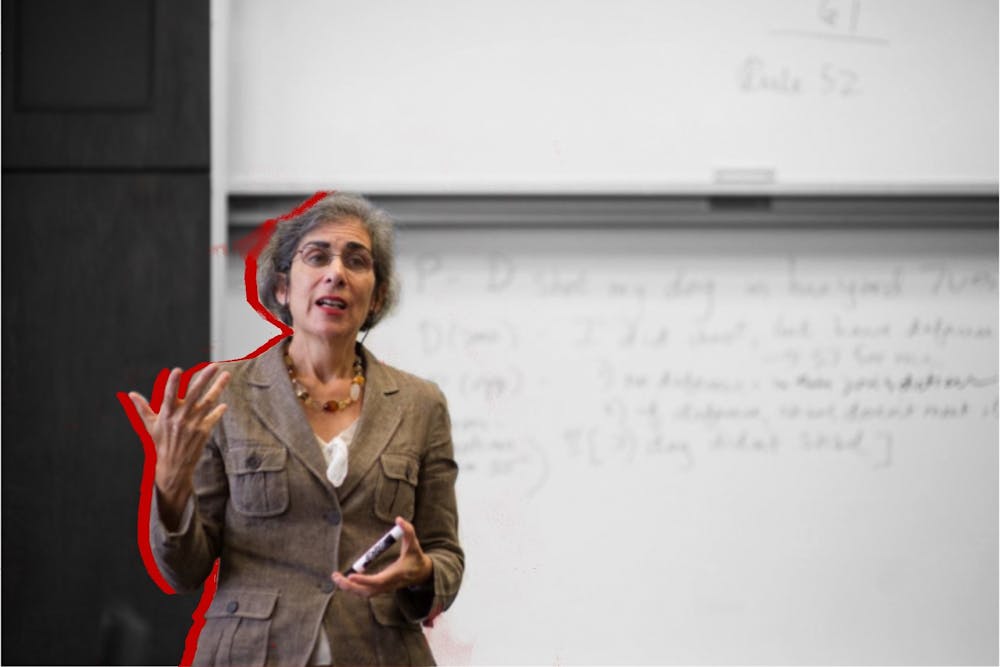Penn’s Undergraduate Assembly and three other student organizations passed a resolution on Feb. 20 calling for the termination of Penn Law School professor Amy Wax on the basis of her repeated promotion of white supremacist ideology.
Wax, who is currently the Robert Mundheim Professor of Law at Penn Law, has faced ongoing criticism for racist remarks in the past several years. In 2018, she was barred from teaching a mandatory first-year course after she falsely alleged that she had never seen a Black student graduate in the top quarter of their class at Penn Law. Most recently, Wax sparked national scrutiny for claiming that "the United States is better off with fewer Asians and less Asian immigration."
The UA resolution, written in tandem with the Graduate and Professional Student Assembly, the Penn Law Council of Student Representatives, and the Wharton Graduate Association, outlines Wax’s offenses. The resolution states Wax has “espouse[d] racist and derogatory commentary regarding the presence of Asian Americans and Asian nationals in the United States,” and has “made statements indicating that Black people have lower IQs and commit more crime.”
In addition to Wax’s termination, the resolution also calls for transparency regarding her sanctions hearing procedure, public notice of any sanctions levied, and expansion of measures on campus to combat hateful speech. It also requests that Wax’s teaching duties be suspended during the possible sanctioning process.
Penn Law Dean Theodore Ruger previously initiated sanctions against Wax on Jan. 18. The sanctions process will determine whether Wax threatened the University’s mission by violating behavioral standards.
Wax's sanctions process followed a wave of criticism from both Penn community members and government officials. On Jan. 3, Penn Law third-year Apratim Vidyarthi and other Penn law students created a petition, calling on the University to suspend Wax. As of Feb. 28, it has garnered over 2,500 signatures. The Philadelphia City Council also sent a bipartisan letter on Jan. 10 to University officials, urging them to review Wax’s role within the University.
According to UA President Tori Borlase, resolutions passed by the UA do not require or guarantee the Penn administration will respond to or act on them, but they signify to the administration that students are concerned about certain issues.
The UA previously passed a resolution in 2019 calling for Wax’s termination and alleging that Wax violated University policy. However, Borlase said that not all of the UA’s requests from the resolution passed in 2019 were granted.
RELATED:
Penn Law’s Amy Wax doubles down on racist comments, says she will not resign ‘without a fight’
Penn Law professor Amy Wax’s anti-Asian comments spark national scrutiny
“Penn has refused to recognize student groups, including the UA, as official members of this process,” Borlase said. “I hope the Penn administration will see that this is an issue that many Penn students care about.”
Michael Krone, a first-year Penn Law student in the Carey JD/MBA program who currently serves as the interim Professional Council Chair for the Graduate and Professional Student Assembly, was one of the authors of the resolution. He said that the resolution’s writers wanted to limit the resolution’s goals to things that they knew “were possible and achievable.”
Krone, who is also a member of Penn Law's Council of Student Representatives, explained how he hopes the process can be applied to future cases regarding similar matters and improve expediency and transparency.
“Success for me looks like this process being much quicker, much more transparent, and applying much more tangible sanctions than otherwise absent intervention of the voice of students,” he said. “The problem is not going away. We need to keep our voices active until something is done.”
Robert Watson, the GAPSA Wellness Director and the Chair of the GAPSA Subcommittee regarding Amy Wax, also helped write the resolution. He noted that one of the biggest things discussed while the resolution was being written was whether or not to call for Wax’s termination, which he said that he was heavily in favor of pushing for.
Watson, who is in the JD/MSEd Education Policy Program, echoed Krone’s sentiments about the need for the University’s transparency during the sanctioning process.
“The problem is that the timeline by which [University sanctioning] happens is extremely unclear — to the extent that we don’t really know what stage they’re at right now,” Watson said.
He said that the University's handling of Wax’s case represents a larger issue that goes beyond just Wax.
“What does it mean for the university to continue to hire, and continue to have as a professor, someone who has openly espoused white supremacy view points?” he said. “This isn’t just about Professor Wax. This is more procedurally about how we address, in the future, professors that will say the same thing.”









